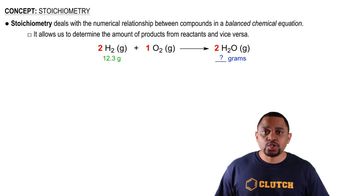Calculate Kc for each reaction. a. I2(g) ⇌ 2I(g) Kp = 6.26⨉10-22 (at 298K)
Calculate Kp for each reaction.
b. N2(g) + 3 H2(g) ⇌ 2 NH3(g) Kc = 3.7⨉108 (at 298 K)
c. N2(g) + O2(g) ⇌ 2 NO(g) Kc = 4.10⨉10-31 (at 298 K)

Verified Solution
Key Concepts
Equilibrium Constant (Kc and Kp)

Reaction Stoichiometry

Temperature Dependence of Kp

Calculate Kc for each reaction.
b. CH4(g) + H2O(g) ⇌ CO(g) + 3 H2(g) Kp = 7.7x1024 (at 298 K)
c. I2(g) + Cl2(g) ⇌ 2 ICl(g) Kp = 81.9 (at 298 K)
Calculate Kp for each reaction. a. N2O4(g) ⇌ 2 NO2(g) Kc = 5.9⨉10-3 (at 298 K)
Consider the reaction: N2(g) + 3 H2(g) ⇌ 2 NH3(g) Complete the table. Assume that all concentrations are equilibrium concentrations in M.
T (K) [N2] [H2] [NH3] Kc
500 0.115 0.105 0.439 _
575 0.110 _ 0.128 9.6
775 0.120 0.140 _ 0.0584
Consider the following reaction: H2(g) + I2(g) ⇌ 2 HI(g) Complete the table. Assume that all concentrations are equilibrium concentrations in M.
T (°C) [H2] [I2] [HI] Kc
25 0.0355 0.0388 0.922 _
340 _ 0.0455 0.387 9.6
445 0.0485 0.0468 _ 50.2
Consider the reaction: 2 NO(g) + Br2(g) ⇌ 2 NOBr(g) Kp = 28.4 at 298K In a reaction mixture at equilibrium, the partial pressure of NO is 108 torr and that of Br2 is 126 torr. What is the partial pressure of NOBr in this mixture?
